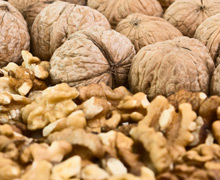
Packing a handful of walnuts for a snack at school may not be the first choice of a hungry kid, but it would be if their brain has its way. New research from Spain found eating walnuts aided the cognitive development of young teens at a time when their brains are going through a critical stage of progression.
Scientists from the Barcelona Institute for Global Health wanted to know if the compounds in walnuts would benefit the cognitive development of adolescents and contribute to their psychological maturity. They published their findings in the journal eClinicalMedicine.
Walnuts are a good source of a type of omega-3 oil called ALA (alpha-linolenic acid) a fatty acid that plays an important role in brain development. It is thought to be especially significant during adolescence.
"Adolescence is a time of great biological changes: hormonal transformation occurs, which in turn is responsible for stimulating the synaptic growth of the frontal lobe," said lead researcher Jordi Julvez. "This part of our brain is what enables neuropsychological maturation, i.e., more complex emotional and cognitive functions. Neurons that are well nourished with this type of fatty acids will be able to grow and form new, stronger synapses."
The study involved 700 students from 12 different schools. They ranged in age from 11 to 16-years-old and were randomly divided between the control group, which did not receive any type of intervention, and the study group that was asked to consume 30 grams of walnut kernels daily for a period of six months.
Those who ate the walnuts increased their attention functions and the ones in the study group who previously exhibited symptoms of ADHD (attention deficit hyperactivity disorder) significantly improved their behavior. They were less hyperactive in class and paid more attention to the teacher.
There was also an increase in functions researchers called fluid intelligence, which, according to Julvez, "is less influenced by learning; it is inherent to the person’s biology status. We assessed it with increasingly complex tests, such as having adolescents figure out what pattern a row of letters followed, for example.
"Overall, no significant differences were found in the intervention group in relation to the control group," he added, "but if the adherence factor is considered, then positive results are observed, since participants who most closely followed the guidelines—in terms of the recommended dose of walnuts and the number of days of consumption—did show improvements in the neuropsychological functions evaluated."
Researchers said the study shows the importance of healthy protocols, especially during this critical stage of development.
"If boys and girls would heed these recommendations and actually eat a handful of walnuts a day, or at least three times a week, they would notice many substantial improvements in cognitive abilities, and it would help them face the challenges of adolescence and entering adulthood," said study author Ariadna Pinar. "Adolescence is a period of great brain development and complex behaviors that requires a significant amount of energy and nutrients."
